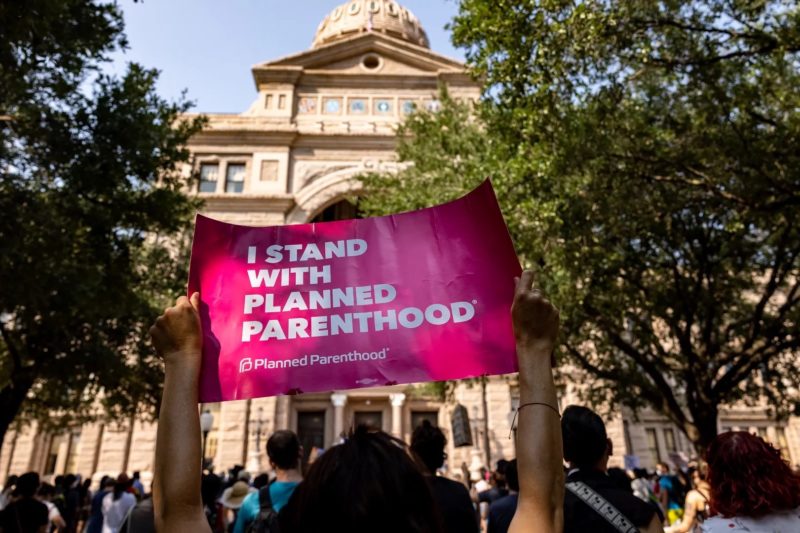Planned Parenthood’s Place as Texas’ Anti-Abortion Law Causes Panic Among Some
By Caroline Zwillenberg
Reporting Texas
 If the rally at the Texas capitol and others across the nation last month are any indication, feelings of panic and outrage have erupted from not only women, but from others who have childbearing loved ones and oppose a move away from reproductive rights.
If the rally at the Texas capitol and others across the nation last month are any indication, feelings of panic and outrage have erupted from not only women, but from others who have childbearing loved ones and oppose a move away from reproductive rights.
On Sept. 1, Texas Senate Bill 8 went into effect. It imposes some of the United States’ tightest restrictions on abortion, banning abortions upon the detection of cardiac activity, which usually occurs at six weeks and is before many women know they are pregnant.
“The law prohibits abortions whenever an ultrasound can detect what lawmakers defined as a fetal ‘heartbeat,” said Neelam Bohra, Texas Tribune fellow. “Though medical and legal experts say this term is misleading because embryos don’t possess a heart at that developmental stage.”
SB 8 prevents abortions when a heartbeat is detected in a fetus. The law allows citizens the right to sue abortion providers, without any connection to the provider or patient. This law is unusual because generally for someone to sue another person, they must have some sort of injury or stake in the case, but SB 8 grants citizens the right to place themselves in a situation that is typically a private matter. This provision of SB 8 is attempt by its proponents to get around the constitutional constraints imposed on the governments to restrict a woman’s reproductive rights.
“I have daughters, granddaughters and nieces,” said Dr. Alan Braid, a Texas physician who performed an abortion just five days after SB 8 initially went into effect, in an opinion piece from The Washington Post. “I believe abortion is an essential part of health care. I can’t just sit back and watch us return in 1972.”
SB 8 not only prevents abortions in cases of unplanned pregnancies, but also in cases of rape and incest. This can lead to physically and mentally unhealthy babies being born because in many cases of incest there is a higher likelihood of severe birth defects.
“It is unfair for the women that have to carry something in their body for 9 months against their will,” said Kara Eisenstat, communication and marketing intern at Planned Parenthood of Greater Texas. “Overall, it is just not OK, and the heartbeat bill spreading to other states is not only harmful to women, but to future generations.”
As the oldest nonprofit organization that provides reproductive health care, Planned Parenthood says it aims to build a world in which every person, regardless of race, income, insurance, gender identity, sexual orientation, abilities or immigration status, can receive expert, compassionate health care, education and information without shame or judgment. Planned Parenthood offers reproductive health care, like birth control, emergency contraception, HIV services, STD testing and treatment, LGBT services, as well as men’s health services, general health care and abortion access or referral.
“Planned Parenthood is a vital place that helps women with not just sexual and reproductive health but for common issues that could affect any person,” said Kristina Harrington, University of Texas at Austin junior psychology and government major. “They are also an educational entity and provide vital information to patients to make sure they practice safe sex, know how to do breast examinations, and more.”
Planned Parenthood supports women in both the most traumatic of times, like after being assaulted, and in the happiest of times, like finding a heartbeat of a baby you have been trying to conceive for years.
“When I was assaulted, I was able to go to Planned Parenthood and get an STI screening,” Harrington said. “It was an amazing, judge-free zone full of caring people. They also offered rape counselor referrals. In addition to this, I was also able to see a regular provider and get tested for thyroid issues as well as for anemia.”
While SB 8 essentially puts a stop to abortions in Texas, Planned Parenthood will continue to provide all the health care they can as well as continue to educate and provide support during a challenging time, Eisenstat said.
The law was signed by Gov. Greg Abbott on May 15 but did not become effective until Sept. 1. On Sept. 9, The U.S. Department of Justice filed a lawsuit, U.S. v. The State of Texas, stating that SB 8 was unconstitutional because it interfered with a woman’s right to control her body and general reproductive rights. On Oct. 6, U.S. District Judge Robert Pitman ruled that the law be suspended, then on Oct. 8, U.S. Court of Appeals for the Fifth Circuit vacated Pitman’s order, halting the suspension of the law and allowing it to go back into effect. A hearing is scheduled before the Fifth Circuit in December.
“Everything that we can still legally do, we will do,” said Eisenstat. “The only real aspect of our health care that is affected is abortions. All other aspects are, for now, remaining untouched and are still very accessible.”